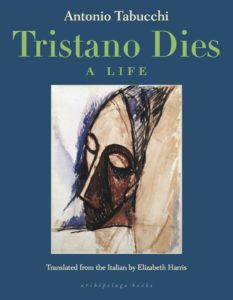Tristano Dies: A Life
Antonio Tabucchi, translated from the Italian by Elizabeth Harris
Archipelago Books
It’s hardly a matter of speculation that Antonio Tabucchi (1943-2012) set his novels Pereira Declares (1994) and Tristano Dies (2004) against the backdrop of European fascism—the former at its onset and the latter after its fall—in order to inquire, by revealing the undisclosed consciousness of his protagonists, to what extent his era was different from theirs, and to what extent it was the same. Pereira, the aging editor of the culture supplement of a Lisbon paper, and a former crime reporter, shows his mettle not when he harbours the young dissident Rossi, but when he politely goes toe-to-toe with his Salazarist Editor-in-Chief, in the brilliant twenty-first chapter. The eponymous main character of Tristano Dies complements the civilian dissent of the earlier novel with that of a World War Two veteran. This book isn’t about the past, but deals with our present time. In contrast to William Butler Yeats, who aspired to hold reality and justice in a single thought, Tristano takes the measure of our new century when he says that “at times it’s so hard to tell the difference between cruelty and justice.” Tabucchi’s sensuous and allusive prose dismantles our globalized moment and clears a space for Freedom to reside, in peace if not at ease. Elizabeth Harris’ translation expands the linguistic resources of fiction in English, much as the original text enriched the fictional landscape of Italy when it first appeared.
Tristano, a defector from Mussolini’s army, and a hero of the Greek and Italian resistance movements, summons a novelist to his deathbed in 1999, and dictates his life story, in self-accusations, gripes, rants, snatches of songs and poems, anecdotes, excuses, deliria and lengthy recursive digressions, narcotized and hallucinatory, wavering on the brink of consciousness, intermingling memory and perception, stubbornly succumbing to gangrene in a remote pension instead of allowing his leg to be amputated, alone but for an old German caregiver who administers his morphine and reads poems to him, and the silent author who fictionalizes his tale: “I feel sorry for you, but I’m not sure what you were expecting when you came here to see me, I’m not here to confirm anything, just the opposite…”
Tristano holds Creative Writing in high regard (“How funny, in so few pages, you managed to be what a real person never was in his entire life”) but is blind to its status (“maybe remind them of Byron, who died for these things, who knows, maybe that’ll have an impact”), and he recognizes, conversely, the status that literature confers upon its sources (“I want to remain in written words, and if you can’t write it down now, then record it in your mind, mentally record it, and then write it in your own words, like I know you can, someone tells you one thing, and you write it so it seems like something else”). He speculates as to whether déjà vu is the Freudian “return of the repressed,” or a neurological “distortion of the cataloguing of time in the nervous system,” concluding that it is both of these things at once:
If you really think about it, the point of view belongs to the dream, in the sense that it’s the dream’s point of view, not mine, not Tristano’s, because you can’t control dream, just like you can’t control the heart, you have to live dreams the way they want to be lived, and this dream wanted me to dream Tristano, like so…
Tristano praises his interlocutor’s prose, noting that “it explores nuances, chiaroscuro, you’re a different sort of hunter, an ambiguity detective, you’re always wary, even of yourself.” And yet, for all his espousal of Culture as the raison d’être of democracy, Tristano points up a limit of authorship when he explains that every choice involves a rejection of the options that are refused (“just the right amount of happiness for the just world we’re building, a just world for a just society built by just comrades just like you, dear comrade”)—in his case the decision to defect and join the Resistance, a moment evoked in a previous book by the fictional author of Tristano Dies (“And you know what he chose because you know what freedom is, you’re a liberal intellectual”), and a decision after which, Tristano says, speaking about himself, as so often, in the third person, “he came to question why, something you didn’t do, and why on earth would you, if the principle, the ideal, was sound?”
In the course of a human life on Earth, whatever portion of meaning may be made, it will not much reside in a catalog of the differences between totalitarian fascist regimes and federal democratic republic nation-states. Rather, meaning emanates from the cast of mind of a person who lives within such systems, as seen in an action, a turn of phrase, a gesture, regardless of status—not “behaviour” but character—so that prose fiction, far from being a bridge across the abyss of human loneliness (that co-opted, utilitarian notion), instead transmits to all, the author included, an intimation of what is not and cannot be known, even by the author: the book’s place, the place of a work of written art within the tradition to which it belongs, and, by analogy, the place of a person in the world, and in the cosmos. We want the very posing of the question to be enough, and that desire is everything, a wish that grants itself.
Dying, Tristano—the Tristano who, to an unknown degree, is the creation of the unspeaking, nameless author of the novel within the novel Tristano Dies: a Life—speaks about his loves, pseudonymously, and refers only to his favourite writers by their true names; in that long list, he doesn’t mention Antonio Porta, an Italian poet and Antonio Tabucchi’s near-contemporary; at least, Tristano does not name him outright; an allusion may be present in the Italian text, beyond this reviewer’s ability to detect; and yet one imagines, amidst the asperities of Porta’s verse, a discovery, one that Tristano must surely have happened upon, and enjoyed, back when the collection of which it is a part appeared in the early ’eighties. It consists of eleven lines, with no title:
now there are only movements of images on the tv
or movie screen but the apertures and proportions are our doing
a pony’s gallop behind a cosmetic cloud of dust
a pint-sized horseman shooting off into silence
(due to audio problems the sound’s been lost)
in a black-and-white sequence that gives way
to color we won’t believe in as blissful sleep comes over us
and the film gets run through a second time
and the dream gets even harder to explain
mirrored in a pond of alcohol exuding a scent of juniper
on whose glistening sands the day retires

